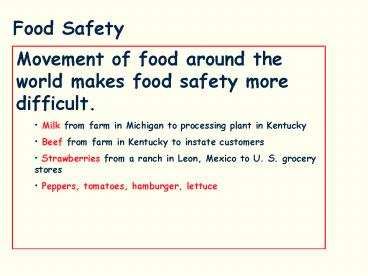Food Safety - PowerPoint PPT Presentation
1 / 24
Title:
Food Safety
Description:
Contaminated cooking utensils or poor refrigeration is more common. Food Safety - Bacteria ... Check cooking temp, should be 160 F. Don't exceed expiration date ... – PowerPoint PPT presentation
Number of Views:1521
Avg rating:3.0/5.0
Title: Food Safety
1
Food Safety
- Movement of food around the world makes food
safety more difficult. - Milk from farm in Michigan to processing plant
in Kentucky - Beef from farm in Kentucky to instate customers
- Strawberries from a ranch in Leon, Mexico to U.
S. grocery stores - Peppers, tomatoes, hamburger, lettuce
2
Food Safety
- Cases Year in U.S.
- The Centers for Disease Control and Prevention
(CDC) estimates that in the United States alone,
food poisoning causes about 76 million illnesses,
325,000 hospitalizations, and up to 5,000 deaths
each year. One of the most common bacterial forms
of infection, the salmonellae organisms, account
for 1 billion in medical costs and lost work
time.
3
Food Safety
- Food safety problems may occur at the source of
the origin of the food or at the point of
preparation and consumption. - Most common caused by a bacteria or bacterial
toxin - Pesticides pose a minor problem
- Antibiotic residues from treatments of animals
is seldom a problem - Contaminated cooking utensils or poor
refrigeration is more common
4
Food Safety - Bacteria
- Gram negative stained E-coli
- Spread in feces
- Meat or plants
Source - farm
5
Food Safety - Bacteria
- Microimage of Salmonella
- Spread in feces
- Human carriers
Source - farm
6
Food Safety - Bacteria
- Stain of Campylobacter
- Spread in feces
- Raw milk or cheese
- Young children
Source - farm
7
Food Safety - Bacteria
- Stain of Yersinia
- Spread in feces
Source - farm
8
Food Safety - Bacteria
- Stain of Listeria
- Found in raw milk and cheese
Source - farm
9
Food Safety - Bacteria
- Stain of Staphylococcus
- Common on skin and human carriers
Source farm or other
10
Food Safety - Processor
- Cleaning problems, bacteria form BIOFILMS
- Poor cleaning of containers, no brushing
- Over capacity of pasteurization, proscess
exceeds pasteurizition capacity - Failure to clean at regular intervals, every
8-12 hrd - Improper food storage warm temps, open coolers
- Poor refrigeration above 40 F, bacteria grow
- Contamination at slaughter, careful practices
11
Food Safety - Transportation
- Hauling food products without proper cleaning as
cracked eggs then milk - No cooling during haul
12
Food Safety - Imports
- Illegal imports
- Illegal meat from China caused FMD outbreak in
England - Under cooked pork sandwiches from eastern Europe
caused swine fever outbreak in western Europe,
was brought in by military
13
Food Safety - Retailer
- Open coolers, are they cold enough
- Expiration dates, use before that date
- Improper display, cooling or warming
- Remanufacture, yesterdays fried chicken is
todays chicken BBQ
14
Food Safety - Home
- Undercooking ground meats
- Improper cleaning, no hot water
- Handle raw food and then cooked food handling
with same equipment recontaminates the cooked food
15
Food Safety Food Preservation
- Bacteria need 3 conditions for growth
- Moisture
- Warmth
- Nutrient supply
16
Food Safety Food Preserevation
Bacteria need 3 conditions for growth Moisture
for metabolic processes Warmth grow best at
100 F but some grow well at 45 F Nutrient
supply food plus oxygen or carbon
dioxide Eliminate any one of the 3 and bacterial
growth slows or stops
17
Food Safety - Drying
- How dry ?
- Sunlight roof
- Osmosis sugar or salt
- Mechanical dried milk
- Freezing/vacuum freeze dried foods
- Food dehydrators
18
Food Safety - Cooling
- Cool below 32 F stops most bacterial growth
- For long term storage of specimens store at -80 F
19
Food Safety - Heating
- Heating above 160 F kills most bacteria
- Washing in high temp water with soap kills most
bacteria - Combination of heat and pressure kill most or all
bacteria (pressure cooker) - Regular milk pasteurization (HTST), 165 F for 15
seconds, kills most bacteria - UHT pasteurization, 275-300 F for 1.5 seconds
kills all bacteria
20
Food Safety - Nutrient
- The food we are trying to preserve is the
nutrient source for the bacteria - Control oxygen and carbon dioxide
21
Food Safety New Methods of Preservation
- Irradiation similar to beta radiation, kills
bacteria and viruses, spices and meats - Vacuum packing eliminates oxygen supply
- Nitrogen or inert gas in chips eliminates oxygen
22
Food Safety - Prevention
- Farm inspection on site
- Grade A dairy farms state and federal
- Every load of milk is tested at lest 8 different
tests - Slaughterhouse inspection state and federal
- Restaurant inspection
- Grocery inspections
- Dairy plant inspections
23
Food Safety Home Use
- Check cooking temp, should be gt 160 F
- Dont exceed expiration date
- Follow correct cooking directions
- Use correct cleaning and washing
- Dont refreeze some foods
24
Food Safety
- Check cooking temp, should be gt 160 F
- Dont exceed expiration date
- Follow correct cooking directions
- Use correct cleaning and washing
- Dont refreeze some foods
25
Food Safety - Summary
- Dont drink raw milk
- Dont eat soft cheese from unpasteurized milk
- Dont eat raw or rare meats, especially ground
meats - Check refrigeration temps
- Questions ??????































